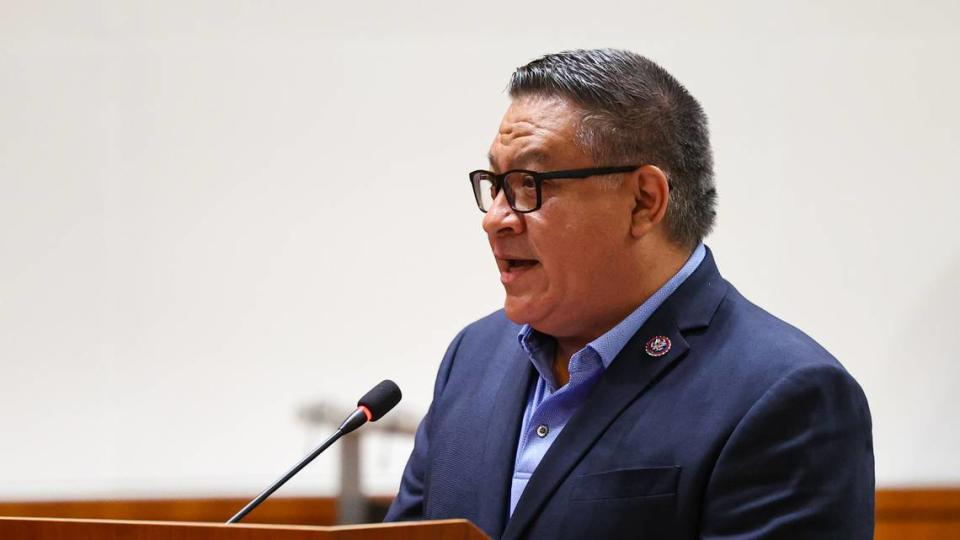Central Coast congressman says keeping Diablo Canyon open is crucial for California
- Oops!Something went wrong.Please try again later.
Keeping California’s last nuclear power plant in operation is crucial for the state’s energy supply, Central Coast congressman Salud Carbajal said Thursday.
Decommissioning Diablo Canyon Power Plant “could cause major power shortages throughout the state,” Carbajal said at a town hall meeting in San Luis Obispo.
“I am open” to the idea of operating Diablo Canyon past 2025 to “make sure that we continue to have the energy that Californians and (we) here on the Central Coast need,” Carbajal said.
Carbajal, a Democrat who represents California’s District 24 in the U.S. House of Representatives, fielded questions about everything from farming to nuclear power at Thursday’s meeting at San Luis Obispo County Farm Bureau headquarters.
More than 40 constituents gathered on a warm afternoon to hear him speak.
Carbajal said he’s dedicated to expanding affordable housing, supporting public safety, civil rights, fostering job growth and lowering the cost of living on the Central Coast.
“I’m committed to raising your — or, should I say, our — quality of life,” Carbajal said.

Congressman: Diablo Canyon Power Plant should keep operating
Located just north of Avila Beach in San Luis Obispo County, Diablo Canyon produces about 9% of the state’s total power.
The 2,200-megawatt power plant was expected to stop operating its twin reactors in 2024 and 2025, but the state failed to procure enough clean energy to replace the plant in time.
In September, the California State Legislature passed Senate Bill 846, which allocated $1.4 billion to PG&E to fund the nuclear power plant’s license renewal costs for staying open through 2030.
That was followed by a $1.1 billion grant to PG&E in November from the U.S. Department of Energy through President Joe Biden’s bipartisan infrastructure law. Carbajal said he worked with the Biden administration to allocate that federal money.
The NRC in March told PG&E it can run Diablo Canyon past its original closure dates without a current license as long as the utility company submits a valid license renewal application for the two reactors by the end of 2023.
On Thursday, Carbajal said he supports keeping the plant in operation as long as federal officials prioritize the facility’s safety.
“My major concern has been that the federal government do everything possible to ensure the continued safety (of Diablo Canyon) as the No. 1 item or principal guiding this expansion,” Carbajal said. “Provided they do that, I am open to supporting this facility continuing to work.”
“I will continue to advocate for all that should be done to address safety and the environmental concerns that have been raised,” Carbajal said.

Can agriculture industry combat climate change?
When asked about agriculture on Thursday, Carbajal said he supports using incentives — rather than mandates or regulations — to encourage farmers to implement new practices that combat climate change.
“Food security and supporting our farmers is a national security imperative,” Carbajal said. “It’s imperative that we’re sensitive to their needs and do things in a phased in way.”
According to Carbajal, that could mean using federal funding to sponsor research, conservation opportunities and grants for climate initiatives such as capturing carbon in the soil.
“I think our farmers have been open and willing — with a little skepticism — to be incentivized,” Carbajal said. “I think our farmers are up to the challenge.”
Carbajal noted that the Farm Bill can be used to create funding and research opportunities for farming practices that emphasize conservation and climate change reduction.
The Farm Bill is a legislative package that addresses food production, food security and more, according to Carbajal’s website.
Congress updates the Farm Bill every five years. The Republican Party, as the majority party in the House of Representatives, will propose a draft for the new version in a month or two, Carbajal said.
With the updated Farm Bill, Carbajal aims to secure more financial support for California’s “specialty crops” including wine grapes and strawberries, he said.
Though the Golden State is known as the “salad bowl of the nation,” Carbajal said, “California rarely gets its fair share (of funding) compared to other states who grow certain commodities like soybeans, corn, and rice.”
Carbajal also hopes to expand crop insurance, along with funding for research and mechanization.
“Mechanization would help our farmers have technology to build on their existing labor shortages, and assist farm workers who are doing back breaking work every day,” Carbajal said.
He also wants to improve disaster relief for farmers, noting that the federal government didn’t provide funding to drain agricultural fields after winter flooding.
“I want to bring about reform to make sure that we are providing more support for our farmers during disasters, fires, floods, drought and other challenges,” Carbajal said.
Inflation Reduction Act lowers insulin prices for seniors
At Thursday’s town hall, Carbajal also touted his achievements on Capitol Hill.
In 2022, Congress passed the Inflation Reduction Act, a massive legislative package that addressed issues from health care costs to climate change initiatives.
One key component of the act is that it capped out-of-pocket costs for seniors enrolled in Medicare at $2,000 per year.
The Act also allowed Medicare to negotiate drug prices with pharmaceutical companies, which resulted in a monthly cap of $35 for insulin prices for seniors, Carbajal said.
“(Before), it would be thousands of dollars a year for their insulin to the point where they’re going broke,” Carbajal said. “Incremental as it might seem, $35 a month was a big leap.”
Carbajal said that he values working “across the aisle” with the Republican Party — supporting bipartisan bills including the Childcare Investment Act, which is designed to expand child care support.
“Even though Washington is usually known for its gridlock, there are a number of major pieces of legislation that we were able to move forward last term that were bipartisan and achieved quite a bit for our country,” Carbajal said.

